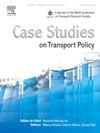Overcoming barriers to delivering active travel infrastructure: inter-agency collaboration in a state-led neighbourhood redevelopment
IF 3.3
Q3 TRANSPORTATION
引用次数: 0
Abstract
This research investigates the challenges to collaboration government agencies face in delivering active travel infrastructure as part of neighbourhood regeneration projects. Through a sociotechnical systems lens, we examine the influence of governance structures, decision-making processes, and institutional norms on inter-agency collaboration. Drawing on document analysis and key informant interviews, we identify opportunities and challenges faced by housing and transport agencies in coordinating the design and delivery of active travel infrastructure. Challenges include a disconnect between strategic objectives and funding mechanisms, bureaucratic inertia and complexity, and a reliance on informal networks within a complex regulatory structure. Despite these challenges, the research highlights the value of forums for knowledge exchange and relational approaches to collaboration, as well as the potential for pragmatic solutions such as collaborative working groups to overcome structural barriers within sociotechnical regimes. Achieving mode shift towards healthier and more sustainable forms of transport requires formalised effective mechanisms for integration of land use and transport planning. Our findings have implications for policymakers, practitioners, and stakeholders involved in shaping urban environments and promoting active mobility as a viable transportation option.
克服提供活跃的旅游基础设施的障碍:国家主导的社区重建中的机构间合作
本研究调查了政府机构在提供活跃的旅游基础设施作为社区再生项目的一部分时所面临的合作挑战。通过社会技术系统的视角,我们研究了治理结构、决策过程和机构规范对机构间合作的影响。通过文件分析和关键信息提供者访谈,我们确定了住房和交通机构在协调设计和交付活跃的交通基础设施方面面临的机遇和挑战。挑战包括战略目标与筹资机制之间的脱节,官僚惰性和复杂性,以及在复杂的监管结构中依赖非正式网络。尽管存在这些挑战,该研究强调了知识交流论坛和合作关系方法的价值,以及务实解决方案的潜力,如协作工作组,以克服社会技术制度中的结构性障碍。实现向更健康和更可持续的运输形式的模式转变,需要将土地使用和运输规划结合起来的正式有效机制。我们的研究结果对参与塑造城市环境和促进主动交通作为一种可行的交通选择的政策制定者、实践者和利益相关者具有启示意义。
本文章由计算机程序翻译,如有差异,请以英文原文为准。
求助全文
约1分钟内获得全文
求助全文

 求助内容:
求助内容: 应助结果提醒方式:
应助结果提醒方式:


